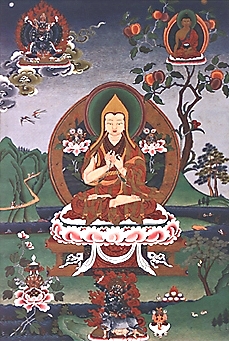Tsongkhapa Lobzang Drakpa
Tsongkhapa Lobzang Drakpa (T. tsong kha pa blo bzang grags pa ཙོང་ཁ་པ་བློ་བཟང་གྲགས་པ་) (1357-1419) was one of the most influential Tibetan Buddhist scholars of the last millennium.[1]
He studied with numerous teachers of all traditions and engaged in many retreats resulting in his development of a fresh interpretation of Nāgārjuna's Madhyamaka view and a reinvigoration of the monastic Vinaya. Widely regarded as an emanation of Mañjuśrī, Tsongkhapa composed eighteen volumes of works of which the majority dealt with tantric subjects. He was the founder of Ganden Monastery, which became the central monastery of the Gelug tradition that was founded on his teachings and writings.[1]
According to John Powers, Tsongkhapa's work "contains a comprehensive view of Buddhist philosophy and practice that integrates sutra and tantra, analytical reasoning, and yogic meditation."[2]
Guy Newland describes Tsongkhapa's philosophical approach as one which combines the existence and validity of logic and ethics (conventionally and contingently) with "a radical view of emptiness" which sees all phenomena as devoid of intrinsic nature.[3]
Further reading
 Tsong_kha_pa, Tsadra Commons
Tsong_kha_pa, Tsadra Commons Tsongkhapa Lobzang Drakpa, Treasury of Lives
Tsongkhapa Lobzang Drakpa, Treasury of Lives
 Tsongkhapa, Stanford Encyclopedia of Philosophy
Tsongkhapa, Stanford Encyclopedia of Philosophy Tsongkhapa, StudyBuddhism
Tsongkhapa, StudyBuddhism Tsongkhapa Lobzang Drakpa, Rigpa Shedra Wiki
Tsongkhapa Lobzang Drakpa, Rigpa Shedra Wiki Je Tsongkhapa, Wikipedia
Je Tsongkhapa, Wikipedia
Notes
- ↑ 1.0 1.1
 Tsong_kha_pa, Tsadra Commons
Tsong_kha_pa, Tsadra Commons
- ↑ Powers, John (2007) Introduction to Tibetan Buddhism, p. 467. Snow Lion Publications.
- ↑ Newland, Guy (2008–2009), Introduction to Emptiness: As Taught in Tsong-kha-pa's Great Treatise on the Stages of the Path, Ithaca, p. 8.
